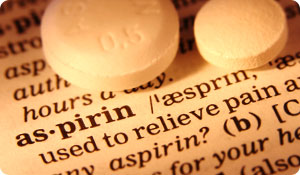
Aspirin-who knew it could be so powerful? For years, aspirin was touted as a quick, safe remedy for various aches, pains, and fever. But now doctors know that aspirin should be prescribed and used with caution. Why? Aside from muting minor discomforts, aspirin prevents your blood from clotting properly. So while this is a major benefit in reducing the risk of heart attacks and stroke (which can be caused when the blood vessels supplying the heart and brain fall prey to clots), it's not great news for people suffering from certain medical conditions such as bleeding disorders or ulcers.
The first step in determining whether a daily dose of aspirin is appropriate for you is to assess your risk factors for stroke and heart disease. Any of the following may mean aspirin is right for you:
- a history of smoking
- diabetes
- high cholesterol (both total cholesterol and LDL)
- high blood pressure
- a previous heart attack or stroke
- a family history of stroke or heart attack
Of course, if you've already suffered a heart attack or stroke, your doctor may have recommended daily aspirin as a preventive measure. If you haven't had a heart attack or stroke but are at high risk, consider bringing up the topic yourself. Don't just put yourself on an aspirin regimen without medical guidance--there are certain circumstances in which aspirin therapy carries great risk, including bleeding disorders, clotting disorders, stomach ulcers, asthma, and heart failure. The risk of taking aspirin if you suffer from any of these conditions may outweigh the protective benefits it bestows. It's also important to let your doctor know about any other medications you may be taking, even something as innocuous seeming as ibuprofen.
If you do embark on an aspirin regimen, be sure to adhere to your prescribed dosage. Taking too much aspirin can cause ringing in the ears and even hearing loss. Try to limit the amount of alcohol you drink, as alcohol also has a blood-thinning effect. And be aware that suddenly stopping your daily dose of aspirin for any reason can lead to a rebound effect that will actually increase your risk of a blood clot, stroke, or heart attack. So talk to your doctor before tossing that pill bottle.
Source: Mayo Clinic, www.mayoclinic.com.





